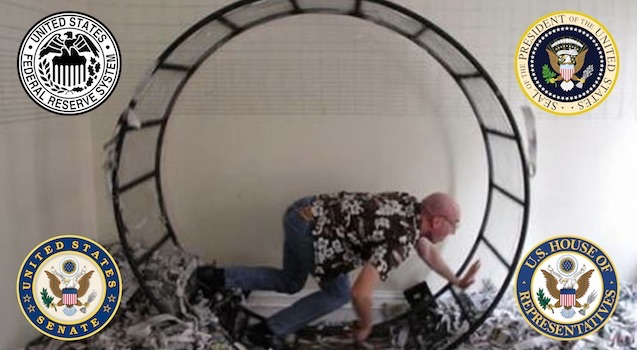|
By Chris Rossini
While the number of Americans living on the government dole continues to astonish, the rest of us must get up and produce. We work, and after the government snatches away its unearned loot, we like to think that we own what's left of our earnings. But do we really own what's left? If we keep what's left in dollar bills, the Federal Reserve is constantly snatching away our purchasing power. The Fed continuously prints dollars by the trillions, reducing what each dollar is worth, and raising our bills to boot. The government itself has a license to steal our earnings right off the top, and then the Fed picks up from there, constantly whittling away the value of what's left. Many of us decide to "own" something more tangible. So we "buy" a house. But even if we pay for the house with cold hard cash, and without a mortgage, do we really own that house? Well, here's another question. What happens if you don't pay the property tax on "your" house? Answer: Bye-bye house. So we don't really own our homes. Every homeowner is in reality just a renter, and property taxes are the rent. The real owner of the house is the government. That kinda puts a damper on the whole "American Dream" thing, doesn't it? You can't stake your claim in the land of the free. The most that you can become is a homeowner *in name only*. What if you decide to take what's left of your earnings and deposit it into a bank? Do you own that money? Well, the moment that you put money into a bank, it goes onto the bank's books as a liability that the bank owes you. You may think that you're putting your money in a safe place for storage, but that's not how the bank treats it. The bank doesn't take your money, wrap a rubber band around it, and store it in a special place for you. That's boring from their perspective. Oh sure, you can come back to the bank and withdraw portions of "your" money when you want. But don't you dare withdraw more than is permissible. If you do, you'll be considered suspicious and will be reported to the government. That's the law. Withdraw the permissible amount of "your" money, and your cool. That amount just gets deducted from the amount that the bank owes you. Let's move away from your friendly neighborhood bank, and take a look at the stock market. After all, you work all those hours, the government snatches away its huge bite, and the Fed whittles away the rest. Maybe you can put your money in stocks. Let it ride a little. You've heard from mainstream media that stocks are the best way to secure your retirement. When has the media ever been dead wrong? So you open up an account at a stock brokerage, and you "buy" 100 shares of Apple stock. Do you really "own" that stock? Of course you do, right? You get a statement in the mail and everything! Well... Simon Black explains...and while you're reading the following, remember the bank deposit example from above: There’s a concept in the US financial system called “Street Name Registration”.
Let's sum this up, shall we?
You work hard. Most of your life is spent working. You can't keep what you earn because the federal government in 1913 gave itself a license to steal what it wants. It's been over 100 years, and if there's one thing we've learned, it's that the government wants a lot! What's the federal budget these days? $4 Trillion? Thank goodness for those "small-government" Republicans, right?............right? Also in 1913, the Federal Reserve was created, and they pick our pockets every single day, after taxes have been confiscated. You can't "own" a house in America. The very best you can do is rent from the government. You don't own your money that's in the bank. It's owed to you by the bank. You don't own stocks either. They're also owed to you. Does it appear that a hamster wheel has been setup here? Does it sound like you're one of the hamsters? Then please don't blame "freedom" or "free markets" or "liberty" when the hamster wheel finally breaks loose of its hinges. Comments are closed.
|
Archives
July 2024
|


 RSS Feed
RSS Feed



